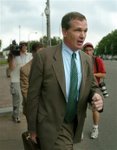USOC asks city for financial guarantees
CHICAGO — The U.S. Olympic Committee team evaluating the competing bids for the 2016 Summer Games ended its two-day visit here Wednesday with a request for financial guarantees, raising questions about the feasibility of this city's plan, specifically the temporary $366-million Olympic Stadium in Washington Park.
The request, voiced by Bob Ctvrtlik, who leads the USOC commission, came nearly a week after a similar inspection trip in Los Angeles, and knocked Chicago bid officials and Mayor Richard Daley off a carefully choreographed message.
At an afternoon news conference, Daley raised the possibility that city tax dollars might be used, a reversal of his previous comments.
He said they were working on achieving guarantees with both "private and public [funds]."
"There's a concern the U.S. Olympic Committee has," Daley said, "and rightly so, and we'll come up with a plan shortly."
The mayor then spent most of the question-and-answer session refusing to provide specifics about the guarantees. The issue could be addressed at a City Council meeting next week, given that the USOC has set a March 31 deadline.
Said Ctvrtlik: "There are many ways guarantees can be constructed. We definitely want the government to have some skin in the game. We've been assured by the mayor that is the case of the city of Chicago."
No such requirements were made of the other finalist, Los Angeles, about its plans to temporarily enhance the Coliseum, costing $112 million. In fact, there have not been any follow-up questions from the evaluation commission, according to a bid official, suggesting a high degree of comfort with L.A.'s plan.
"Because our proposed Coliseum work can be done in 6-9 months, the $112 million is not a capital expense and therefore can be paid for from Games revenues," said bid President David Simon in an e-mail. "If you can't pay for something from Games revenues, i.e., if it will be a major capital expense, the USOC asked that private financing be secured."
For Chicago bid officials, it was a mixed day that started with a light blanket of snow and a protester heckling as the evaluation committee members boarded a bus outside a downtown hotel.
Of more concern was the issue of financial guarantees and a possible mayoral flip-flop detracting from what had been regarded as a positive bid evaluation. This could mean three rocky weeks for local organizers and loss of momentum leading up to the final decision by the USOC on April 14.
"There are basically two issues at hand, and only two," said sports facility expert Marc Ganis, who is based in Chicago. "One is not being embarrassed on the Olympic Stadium. That's a threshold. And the second is to get the 60-some-odd votes that constitute a majority at the IOC [International Olympic Committee] level. Everything else is background noise."
Two other American bids have imploded because of the Olympic Stadium issue: New York, at the international level, in 2005, and San Francisco, in the domestic bid process late last year.
"If the New York embarrassment didn't happen, I don't think we'd be putting as much attention on this today as we are," Ganis said. "I'm not sure our Chicago planners understood the magnitude of the issue to [USOC Chairman] Peter Ueberroth. Either you get this done or don't bother to try to come and play the game."
Said Chicago economist Allen Sanderson: "Chicago has had two recent big-ticket items. Millennium Park was put out at something like $150 to $175 million and came in at $475 [million]. The rebuilding of the Dan Ryan Expressway, which was budgeted at $500 million, will now run over $1 billion.
"There's no way the Olympic cost would not follow that sort of model. I just would like something that would pass Accounting 101."
Jim Scherr, USOC chief executive, mentioned the huge cost overrun of the Millennium Park project as a "factor in our evaluation" but said he felt comfortable with the estimates for the Olympic plans from officials.
As for Daley, Ganis expects he will come through, even if it means going against his pledge.
"You use political capital when it's time to close a deal," Ganis said. "There will be people who will have loud voices against it. But at the end of the day, this man controls this city."




No comments:
Post a Comment